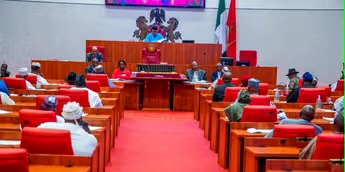The Nigerian Senate has bowed to public pressure, suspending deliberations on four controversial tax reform bills submitted by President Bola Ahmed Tinubu.
The decision follows widespread criticism from stakeholders, who argue that the proposed reforms could deepen economic challenges for ordinary Nigerians. Deputy Senate President Jibrin Barau, who presided over Wednesday’s plenary session, announced the suspension.
He stated that the Senate had decided to pause all public hearings on the bills to allow further consultations and address the contentious issues raised by the public.
Barau explained that the Finance Committee has been directed to halt its proceedings, and a ten-member Senate delegation will engage with the Attorney General of the Federation and Minister of Justice, Lateef Fagbemi, to resolve the disagreements.
This move, he said, underscores the Senate’s commitment to fostering unity and ensuring that the reforms align with the nation’s best interests.
“The Senate and the executive are united in their resolve to find common ground. Our aim is to ensure that these reforms serve Nigerians effectively without imposing undue hardship,” Barau said.
The tax reform bills, aimed at overhauling the country’s revenue system, have faced backlash from various quarters, including civil society groups and economic analysts.
Critics argue that the proposed measures could strain businesses and households already grappling with inflation and economic instability.
Barau assured the public that the Senate remains committed to transparency and inclusivity in the legislative process. He highlighted that extensive discussions have taken place since the bills were introduced, with the goal of addressing potential pitfalls.
The decision to suspend the bills is seen as a strategic move to ease tensions and allow for a more inclusive review process. Barau emphasized that collaboration with the Attorney General is crucial to resolving the disputes and moving forward in a manner that benefits all Nigerians.
By shelving the bills for now, the Senate has sent a strong signal of its willingness to listen to public concerns and prioritize national unity over hasty legislative actions.




